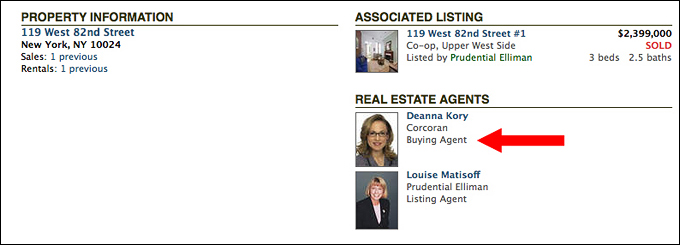 Streeteasy.com Web site
Streeteasy.com Web siteIn the traditionally enigmatic world of New York real estate, some facets of even the most closely-held deals have become tough to hide. Basic information — buyer, seller, price, address — is searchable on the Web once it closes and becomes public record. And the selling agent is easy enough to find between advertisements that prominently feature their names and real estate listings Web sites like Streeteasy.com, which, since 2005, has been matching those listings with records from the city’s Department of Finance. But there are two sides to almost every sale, and despite the past decade’s move toward transparency, information on buyers’ brokers remains more elusive.
Streeteasy.com hopes that changes, said Derrick Gross, a business analyst at the company. StreetEasy rolled out a group of new features last Friday — among them, the ability for buyers’ brokers to claim recent deals as their own.
“There are times that we sell things and there’s no way that anybody knows what we’ve done unless we can claim it someplace,” said Deanna Kory, senior vice president at the Corcoran Group and one of eight brokers who piloted the new feature. Streeteasy.com’s third-party, comprehensive nature “gives people the feeling that it’s a little unbiased,” she said.
Making sure buyers’ brokers get credit for their deals is “the fair thing to do,” said Ric Swezey, a senior associate at the Corcoran Group, who represents both buyers and sellers. “They did half the work.” Swezey, who was not part of the pilot, said he will consider trying out the new feature now that it has launched.
But not all buyers’ brokers will want the recognition. In a market where buyers and sellers alike are increasingly trying to keep their transactions under wraps, many brokers have built their careers on their ability to maintain a low-profile.
Buyers’ brokers who do want to market themselves, however, have long been listing sales on their personal and company Web sites.
To prevent brokers from claiming deals that aren’t theirs, the site will automatically notify selling agents by e-mail when a buyer’s broker indicates involvement with one of their sales, allowing them to dispute any bogus information. A broker can obtain an account with a valid e-mail address from a known firm, or by special permission from Streeteasy.com.
Buyers’ brokers’ claims will appear on the site immediately. Waiting for approval from selling agents would slow things down, Gross said, and Streeteasy.com does not anticipate that brokers will try to abuse the feature.
Nonetheless, the potential for abuse still exists, just as it does with anything else, said Leonard Steinberg of Prudential Douglas Elliman, who was also part of the pilot.
Kory said she views the system as operating with a Wikipedia-style self-enforcement.
In a broader way, Streeteasy.com plans to mine the new buyers’ broker data it collects in order to detect and display the most active brokers in the city’s buildings, Gross said.
Kathy Braddock, co-founder of consultancy Braddock + Purcell and Charles Rutenberg in New York, said consumers should be wary of that kind of data. “Just because a broker does a lot of work in a building doesn’t always mean they’re the best broker to represent you in that building,” she said. “A lot of brokers have monopolized a building in the past and it doesn’t mean anything. It doesn’t mean that they’re great, or good, or awful.”
Still, Braddock noted, “anything that gives more information to the consumer is a great idea.”
Additional new Streeteasy.com features released Friday are part of a new “Pro” account. For $75 a month — a monthly $10 fee already provides “insider” access to closings information, including the new buyers’ broker feature — brokers will now be able to enhance their profiles with vanity URLs, Facebook-style news feeds of their recent listings, closings, and price cuts among other upgrades.